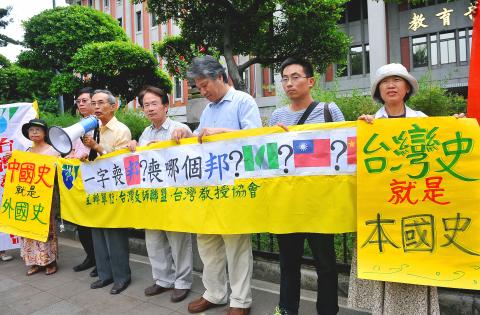|
Sinicization of
textbooks panned
TERMS OF EDUCATION: Civic groups and academics
urged the MOE to uphold its rejection of textbooks that say ‘Japanese
occupation’ as it is a China-centric distortion
By Chris Wang / Staff reporter

Union of Taiwanese Teachers
secretary-general Kuo Yen-lin, second right, Taiwan Association of University
Professors vice president Shiu Wen-tang, third right, and others protest outside
the Ministry of Education yesterday against a recent editorial in the
Chinese-language United Daily News criticizing high school history textbooks for
using the phrase “Japanese occupation period” when referring to the Japanese
colonial era in Taiwan.
Photo: Chien Jung-feng, Taipei Times
Historians and civic groups yesterday
warned about recent attempts to Sinicize the content of history textbooks in
Taiwan, saying that if the Ministry of Education (MOE) compromises on the issue,
students would be taught to adopt worldviews from the authoritarian era.
At separate press conferences, the groups and historians said several textbook
publishers and media outlets’ call to change the term “Japan-governed period” to
“Japanese occupation period” not only violates the current educational
curriculum, adpproved in 2009, but also espouses a China-centric mindset.
“The usage of the terms ‘Japan-governed period’ and ‘Netherlands-governed
period” were agreed upon by Taiwanese historians and educators after years of
debate and discussion. These are neutral terms that state nothing but the
facts,” Chen Yi-shen (陳儀深), an associate researcher at the Institute of Modern
History at Academia Sinica, told one of the press conferences.
The conference was organized by the Taiwan Association of University Professors
and the Union of Taiwanese Teachers, and held in front of the ministry.
Taiwan was ceded to Japan by the Qing Empire in the Treaty of Shimonoseki in
1895, Chen said, adding that if Taiwan had instead been forcefully occupied by
the Japanese, the Qing Dynasty would have taken military action to repossess the
island.
Several pro-independence groups, including the Taiwan Society, the Northern
Taiwan Society and the Hakka Society, said at a separate news conference that
the ministry should stand its ground.
Controversies surrounding high-school history textbooks have been emerging
periodically since President Ma Ying-jeou (馬英九) took office in 2008, when
pan-blue politicians and pro-unification academics recommended revising the
national curriculum approved by the previous Democratic Progressive Party
administration.
The most recent controversy arose when textbooks written by three publishers
were rejected by a ministry review committee in January because they went
against the current curriculum.
The Chinese-language United Daily News and the China Times newspapers both
brought up the issue last week in their editorial pages, saying that the term
“Japan-governed period” was a misrepresentation of history.
The three publishers — Bei Yi Cultural, Shi Ji Cultural and Ke Yi Cultural — are
owned by the same person: Cheng Chih-shen (鄭旗生), executive officer of the
pro-unification Chinese Integration Association (CIA).
CIA chairman Chang Ya-chung (張亞中), a National Taiwan University (NTU) professor,
serves as an honorary consultant for the three companies.
Chang and Cheng have both denied that their political views had anything to do
with the content of the textbooks.
Lee Hsiao-feng (李筱峰), a professor at NTU’s Graduate School of Taiwanese Culture,
said the historical view adopted by the former Chinese Nationalist Party (KMT)
authoritarian regime in the past had created an erroneous perspective of history
to present to Taiwanese.
Lee said he once asked students which country had bombed Taiwan during the
latter part of World War II and found to his surprise that about 70 percent
thought it had been Japan.
This misconception is the result of students’ lack of awareness that Taiwan was
Japanese territory at the time, Lee said, adding that his students had told him:
“The history textbooks taught us that we fought the Japanese for eight years.”
The civic groups and historians said ministry Secretary-General Wang Tsuo-tai
(王作台) was to blame for allowing this “falsification” of history.
Wang earlier this year said that Taiwan’s history should be incorporated as part
of China’s history in the curriculum for high schools and recommended the review
committee consider allowing both “the Japan-governed period” and “the Japanese
occupation period” to be used in textbooks.
Pro-unification academics citing bloodline and culture as the reason Taiwan’s
history should be part of China’s history “does not make sense at all,” Lee
said.
“Americans would never tell you that their history is part of British history
because they share the same heritage. Singaporeans would never agree that their
history is part of Chinese history because they come from the same ethnic
group,” he added.
|
![]()
![]()
![]()